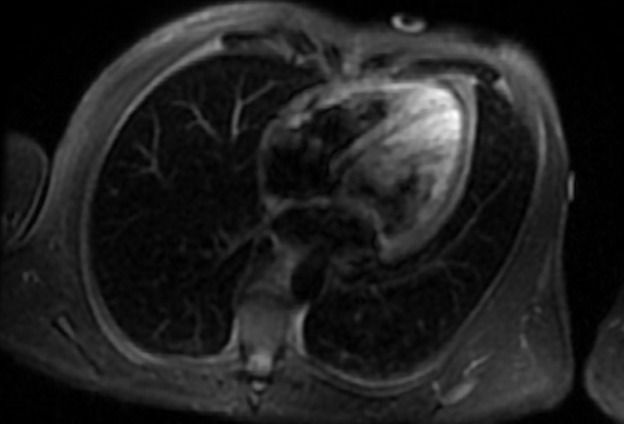Back
Poster Session C - Monday Afternoon
C0442 - A Drug After My Own Heart: Mesalamine-Induced Perimyocarditis
Monday, October 24, 2022
3:00 PM – 5:00 PM ET
Location: Crown Ballroom

Colleen Boyle, MD
Naval Medical Center Portsmouth
Portsmouth, VA
Presenting Author(s)
Colleen Boyle, MD, Sarah Schulte, MD, Brett Sadowski, MD
Naval Medical Center Portsmouth, Portsmouth, VA
Introduction: Mesalamine is a commonly used first line treatment to induce remission in mild to moderate Ulcerative Colitis (UC) that many patients tolerate well. However it does not come without risk and can rarely cause serious and life threatening cardiac and lung inflammation including myocarditis.
Case Description/Methods: A 33 year old male with recently diagnosed ulcerative pancolitis presented with one day of pleuritic, positional chest pain and exertional dyspnea. Two months prior to presentation he had been diagnosed with moderate pancolonic ulcerative colitis and started on mesalamine 1.2 gm twice daily and mesalamine 1000mg suppository every evening, with significant improvement in his symptoms. On presentation, laboratory evaluation was remarkable for elevated troponin to 0.918 and elevated brain naturetic peptide to 2770. Electrocardiogram showed diffuse PR depression and ST elevations consistent with pericarditis. The patient was admitted for further evaluation. Mesalamine was stopped and he was started on Ibuprofen and colchicine with improvement in his pain. Common viral etiologies were ruled out with polymerase testing. A transthoracic echocardiogram revealed moderate global hypokinesis with a reduced ejection fraction (EF) of 25%. A cardiac MRI showed hyperenhancement throughout basal-to-mid inferior and inferolateral wall with ~5% scar burden proving the diagnosis of perimyocarditis. At 1 month follow up his EF recovered to 52%. His UC symptoms have returned since stopping therapy though he remains hesitant to start other UC therapy given concerns regarding adverse effects.
Discussion: Mesalamine induced myocarditis is a rare but potentially lethal complication. It typically occurs within 1-2 weeks of starting the medication but has been reported as early as 48 hours and as late as 4 weeks. The specific pathogenesis of Mesalamine induced myocarditis is unknown. Withdrawal of mesalamine leads to symptomatic improvement in most patients as well as recovery of ejection fraction within weeks of discontinuing the medication, as seen with our patient. Future treatment with mesalamine and other 5-ASA derivatives should be avoided as they can trigger recurrent symptoms. Our case highlights a rare and life threatening complication of a commonly used medication. It also highlights the importance of discussing the potential risks of medications with patients. While rare, these authors recommend discussing the potential for myocarditis when counseling patients on treatment options for UC.

Disclosures:
Colleen Boyle, MD, Sarah Schulte, MD, Brett Sadowski, MD. C0442 - A Drug After My Own Heart: Mesalamine-Induced Perimyocarditis, ACG 2022 Annual Scientific Meeting Abstracts. Charlotte, NC: American College of Gastroenterology.
Naval Medical Center Portsmouth, Portsmouth, VA
Introduction: Mesalamine is a commonly used first line treatment to induce remission in mild to moderate Ulcerative Colitis (UC) that many patients tolerate well. However it does not come without risk and can rarely cause serious and life threatening cardiac and lung inflammation including myocarditis.
Case Description/Methods: A 33 year old male with recently diagnosed ulcerative pancolitis presented with one day of pleuritic, positional chest pain and exertional dyspnea. Two months prior to presentation he had been diagnosed with moderate pancolonic ulcerative colitis and started on mesalamine 1.2 gm twice daily and mesalamine 1000mg suppository every evening, with significant improvement in his symptoms. On presentation, laboratory evaluation was remarkable for elevated troponin to 0.918 and elevated brain naturetic peptide to 2770. Electrocardiogram showed diffuse PR depression and ST elevations consistent with pericarditis. The patient was admitted for further evaluation. Mesalamine was stopped and he was started on Ibuprofen and colchicine with improvement in his pain. Common viral etiologies were ruled out with polymerase testing. A transthoracic echocardiogram revealed moderate global hypokinesis with a reduced ejection fraction (EF) of 25%. A cardiac MRI showed hyperenhancement throughout basal-to-mid inferior and inferolateral wall with ~5% scar burden proving the diagnosis of perimyocarditis. At 1 month follow up his EF recovered to 52%. His UC symptoms have returned since stopping therapy though he remains hesitant to start other UC therapy given concerns regarding adverse effects.
Discussion: Mesalamine induced myocarditis is a rare but potentially lethal complication. It typically occurs within 1-2 weeks of starting the medication but has been reported as early as 48 hours and as late as 4 weeks. The specific pathogenesis of Mesalamine induced myocarditis is unknown. Withdrawal of mesalamine leads to symptomatic improvement in most patients as well as recovery of ejection fraction within weeks of discontinuing the medication, as seen with our patient. Future treatment with mesalamine and other 5-ASA derivatives should be avoided as they can trigger recurrent symptoms. Our case highlights a rare and life threatening complication of a commonly used medication. It also highlights the importance of discussing the potential risks of medications with patients. While rare, these authors recommend discussing the potential for myocarditis when counseling patients on treatment options for UC.

Figure: Cardiac MRI with myocardial inflammation
Disclosures:
Colleen Boyle indicated no relevant financial relationships.
Sarah Schulte indicated no relevant financial relationships.
Brett Sadowski indicated no relevant financial relationships.
Colleen Boyle, MD, Sarah Schulte, MD, Brett Sadowski, MD. C0442 - A Drug After My Own Heart: Mesalamine-Induced Perimyocarditis, ACG 2022 Annual Scientific Meeting Abstracts. Charlotte, NC: American College of Gastroenterology.
